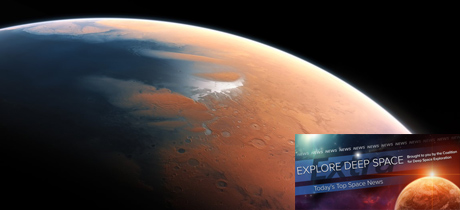In Today’s Deep Space Extra… Romania signs the Artemis Accords. United Launch Alliance places GOES-T weather satellite into orbit. Russia looks to China for space cooperation, but sanctions could impact new plans.
Human Space Exploration
Congress presses NASA for more details on Artemis costs and schedules
SpaceNews.com (3/2): A U.S. House Space and Aeronautics Subcommittee session on Tuesday featured exchanges over the cost, schedule, and oversight of NASA’s Artemis initiative with witnesses from independent NASA advisory and audit organizations. Those included NASA Inspector General (IG) Paul K. Martin; William Russel of the General Accountability Office (GAO); and Patricia Sanders, chair of the NASA Safety Advisory Panel. Members of both parties said they were waiting for long-promised plans from NASA on how Artemis will be managed while ensuring it supports eventual human missions to Mars. “By all accounts, Artemis is facing significant challenges. The advisory boards, reviews and audits are sounding warnings,” said Rep. Don Beyer (D-VA), chair of the subcommittee. “Schedule delays and cost growth years in the making, a confusion mishmash of contract types and untried approaches to organizations and management are just a few of the concerns that have been raised.”
Romania signs the Artemis Accords
SpaceNews.com (3/2): At a virtual ceremony March 1, Romania became the 16th nation to sign the Artemis Accords. President and CEO of the Romanian Space Agency Marius-Ioan Piso signed the Accords on behalf of Romania. The Artemis Accords are a set of nonbinding commitments, grounded in the Outer Space Treaty of 1967, to facilitate the peaceful and safe exploration of outer space. The other signatories of the Artemis Accords are Australia, Brazil, Canada, Israel, Italy, Japan, the Republic of Korea, Luxembourg, Mexico, New Zealand, Poland, Ukraine, United Arab Emirates, United Kingdom, and the United States.
Space Science
A Mars meteorite shows evidence of a massive impact billions of years ago
Universetoday.com (3/1): Northwest Africa (NWA) 7034 is the only sedimentary rock among the collection of meteorites of Martian origin now in possession by scientists on Earth. A new Australian-led study of the mineral zircon from the rock suggests Mars was not host to a habitable environment by 4.2 billion years ago, as previously estimated. The zircon structure in the rock’s sample reflects evidence the material in the Mars meteorite was subject to a large impact event. While the research continues, the finding suggests that life may have arisen on Mars after, not before it arose on the Earth. The study was published in the journal Science Advances.
Night sky, March 2022: What you can see this month [maps]
Space.com (3/1): The March night sky offers views of Mars, Venus, Saturn and the crescent Moon in the predawn, and more if viewing with binoculars or a telescope. This link offers a detailed night sky viewing guide for the month ahead.
Other News
ULA’s mighty Atlas launches long-delayed GOES-T Geostationary Earth-watcher
Coalition Members in the News – Lockheed Martin, Northrop Grumman, United Launch Alliance
Americaspace.com (3/1): NOAA’s GOES-T weather satellite successfully launched from Cape Canaveral Space Force Station, Florida, atop a United Launch Alliance (ULA) Atlas V on Tuesday at 4:38 p.m. EST. GOES-T is the third in a series of four planned advanced weather satellites equipped to track weather developments over North, Central, and South America as well as solar activity and climate change from geosynchronous orbit.
Russia looks to China for collaboration in space but faces isolation over Ukraine invasion
SpaceNews.com (3/1): If not the West, Russia will turn to China for the microelectronics it requires for its space industry, Dmitry Rogozin, head of Roscosmos, Russia’s space agency, told national media earlier this week. Rogozin was acknowledging the impact of sanctions imposed by the West in response to Russia’s incursion into Ukraine. However, China seems to be attempting to avoid being caught up in the repercussions Russia seems to be facing. “I think China increasingly finds itself in between a rock and a hard place,” says Matti Nojonen, a professor of Chinese culture and economy at the University of Lapland, noting that while Beijing has moved toward a closer relationship with Moscow, nearly the whole world community is turning against Russia.
Russian rocket to launch OneWeb satellites Friday despite Ukraine invasion
Space.com (3/2): Over 30 small satellites are scheduled to launch atop a Russian rocket on Friday, March 4, and not everyone is happy about it. Soyuz is on track for the planned launch on Friday at 5:41 p.m. EST, but some are questioning whether the liftoff should proceed. One of those people is United Kingdom Member of Parliament Darren Jones, the chair of the House of Commons’ Business, Energy and Industrial Strategy Committee. Jones sent a letter today to George Freeman, the UK’s Minister for Science, Research and Innovation, asking whether Freeman’s department “considers this situation inappropriate.”

